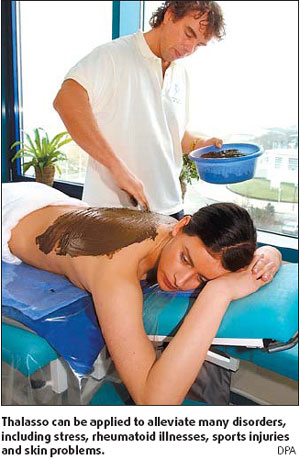Soaking up the healing powers of the sea
HAMBURG: Every year countless vacationers take a beach holiday as a way to relax, feel the surf on their feet, the warmth of the sun on their skin and the wind in their hair.
The sea's effect on health is also the focus of Thalasso, a Greek word that means therapy through the sea. Thalasso has made some things applied in ancient Greece by Hippocrates beloved today.
"Thalasso uses the power of the sea with its potential to hold trace elements, vitamins, proteins and minerals that are in the water, algae and mud," says Katrin Hofrichter of the association of German Thalasso centers.
Lutz Hertel of the German "wellness" association in Dusseldorf says Thalasso can be applied to alleviate many disorders, including stress, rheumatoid illnesses, sports injuries and skin problems.
"The classic Thalasso therapy lasts six days," says Hofrichter, adding, "During this time each patient does three individual applications and one group application."
Seawater baths, algae and mud-packs and massages are all part of the therapy. Other aspects include water gymnastics and "Vichy showers" in which the body is sprinkled with a fine spray of warm seawater. Walks on the beach are also encouraged as part of the therapy.
There are just a few centers in Germany offering complete Thalasso programs. Experts say it's not possible to get the full effect of Thalasso by doing only bits of the therapy.
The European spa therapy association, therefore, has set criteria requiring centers and hotels offering Thalasso to be located near a coastline.
The coast is important because sea air is considerably cleaner than air in the city, says professor Carsten Stick of the institute for medicinal climatology at the University of Kiel.
Aside from that there is the salt contained in sea air. The complex composition of the air helps people with neurodermatitis and chronic respiratory problems.
The thermal-hygric complex means that sea air is less humid and is subject to less temperature fluctuations than inland. That's helpful to heart patients and people with circulation problems.
In addition there's the actinic complex - the ultraviolet rays - that take effect better at the sea than in the city and can counteract against skin conditions such as psoriasis, says Stick.
But Thalasso is not without limitations. The warm mud packs and water therapies can cause difficulties for pregnant women and people with high blood pressure, says Hertel.
Also, people who cannot tolerate iodine, who have open wounds or who suffer from deep depression should speak to their doctor before undergoing Thalasso.
Despite the limitations, thousands of people annually opt to undergo Thalasso therapy. They advance to an enjoyment of positive ongoing factors, according to Stick.
He adds that the sea encourages most people to move their bodies, even when they are otherwise inactive. Aside from that, in a psychological view, light lifts the mood.
DPA
(China Daily 06/13/2007 page19)














